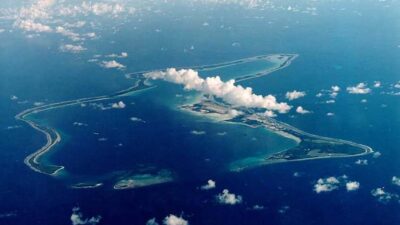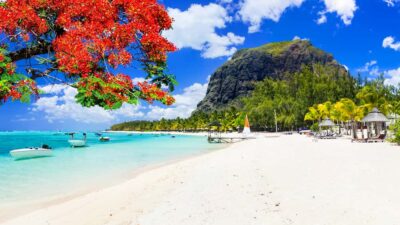Under the leadership of Dr. Navin Ramgoolam, the current government of Mauritius is embarking on an ambitious journey to restore democratic integrity and revitalize the nation’s economy. Following a turbulent period marked by political scandals and economic challenges, Ramgoolam’s administration is prioritizing transparency, institutional reform, and sustainable growth to rebuild public trust and position Mauritius as a beacon of stability in the Indian Ocean. This article explores the multifaceted strategies employed by the government to achieve these goals, drawing on recent developments and the broader context of Mauritius’ political and economic landscape.
A Commitment to Democratic Renewal
Mauritius has long been celebrated as a model of democracy in Africa, but recent years have seen concerns about the erosion of democratic norms, fueled by high-profile scandals such as the MedPoint and Betamax affairs. These controversies, which involved allegations of corruption and mismanagement, strained public confidence in governance and highlighted the need for robust institutional reforms. Dr. Ramgoolam’s government, which assumed power following the 2024 general elections, has made restoring democratic integrity a cornerstone of its agenda.
Strengthening Institutional Independence
One of the government’s first steps has been to reinforce the independence of key institutions, including the judiciary, the Electoral Commission, and the anti-corruption agencies. Recognizing that public trust hinges on impartiality, the administration has introduced measures to insulate these bodies from political interference. For instance, amendments to the appointment processes for senior judicial and electoral officials aim to ensure merit-based selections, reducing the risk of partisan influence. Additionally, the Independent Commission Against Corruption (ICAC) is being empowered with greater investigative powers and resources to tackle high-level corruption cases, signaling a zero-tolerance approach to graft.
Enhancing Transparency and Accountability
Transparency is another pillar of Ramgoolam’s democratic restoration efforts. The government has pledged to overhaul the Freedom of Information Act to make government operations more accessible to citizens. By mandating the proactive disclosure of public contracts and financial transactions, the administration seeks to prevent the kind of opaque deals that characterized past scandals. Furthermore, a new code of conduct for public officials has been introduced, requiring ministers and civil servants to declare their assets annually and recuse themselves from decisions involving conflicts of interest.
Public participation is also being prioritized. The government has launched a series of town hall meetings and digital consultation platforms to engage citizens in policy-making. These initiatives aim to bridge the gap between the government and the electorate, ensuring that policies reflect the needs and aspirations of ordinary Mauritians. By fostering an inclusive dialogue, Ramgoolam’s administration is working to rebuild the social contract that was frayed by years of political maneuvering.
Rebuilding the Mauritian Economy
Parallel to its democratic reforms, the government is tackling the daunting task of economic recovery. Mauritius faces significant challenges, including a depreciating rupee, high inflation, and a loss of purchasing power, as highlighted by economic analyses in recent years. The global economic fallout from the COVID-19 pandemic and geopolitical tensions have further strained the nation’s export-driven economy, which relies heavily on tourism, financial services, and manufacturing. Dr. Ramgoolam’s administration is adopting a multi-pronged approach to address these issues, focusing on diversification, fiscal discipline, and social equity.
Economic Diversification and Innovation
To reduce Mauritius’ dependence on traditional sectors, the government is investing in emerging industries such as renewable energy, technology, and blue economy initiatives. The Mauritius Renewable Energy Agency (MARENA) has been tasked with accelerating the transition to solar and wind power, aiming to make Mauritius energy-independent by 2035. This not only addresses environmental concerns but also reduces the import bill for fossil fuels, strengthening the balance of payments.
The technology sector is another area of focus. The government has launched the “Digital Mauritius 2030” strategy, which includes incentives for tech startups, investments in digital infrastructure, and partnerships with global tech firms. By positioning Mauritius as a regional hub for fintech and artificial intelligence, the administration hopes to create high-value jobs and attract foreign direct investment (FDI). The success of similar initiatives in Singapore and Rwanda serves as inspiration for this vision.
The blue economy, leveraging Mauritius’ vast exclusive economic zone, is also gaining traction. The government is promoting sustainable fisheries, marine biotechnology, and eco-tourism, with plans to establish a dedicated Ministry of Ocean Economy. These efforts aim to create new revenue streams while preserving the marine ecosystem, aligning with global sustainability goals.
Fiscal Discipline and Monetary Stability
The depreciation of the Mauritian rupee, which has lost 47% of its value against the US dollar since 2014, has been a major driver of inflation and reduced purchasing power. To address this, the government is working closely with the Bank of Mauritius to implement prudent monetary policies. Recent measures include tightening liquidity to curb inflationary pressures and exploring mechanisms to stabilize the rupee, such as increasing foreign exchange reserves through export growth and FDI.
On the fiscal front, Ramgoolam’s administration is committed to reducing the budget deficit, which ballooned during the pandemic. The 2025 budget, described as a response to economic challenges, emphasizes targeted spending on infrastructure and social programs while phasing out subsidies that disproportionately benefit the wealthy. The government is also cracking down on tax evasion, with plans to digitize tax collection systems to improve efficiency and compliance.
Social Equity and Inclusive Growth
Economic recovery is incomplete without addressing inequality, a persistent issue in Mauritius. The government has introduced a progressive tax regime to redistribute wealth more equitably, coupled with increased funding for education, healthcare, and social protection. A universal basic income pilot program is being considered for vulnerable groups, funded by savings from subsidy reforms and higher tax revenues from large corporations.
Small and medium enterprises (SMEs), which account for 35% of GDP and 45% of employment but only 6-7% of exports, are receiving special attention. The government has launched a SME Empowerment Fund, offering low-interest loans and technical support to help these businesses scale up and access international markets. By strengthening the SME sector, the administration aims to create jobs and reduce the economic disparity between large conglomerates and smaller players.
Navigating Political Challenges
Despite these ambitious reforms, the government faces significant hurdles. The legacy of political scandals, such as the MedPoint and Betamax cases, continues to cast a shadow over public discourse. These controversies, which involved conflicts between the Militant Socialist Movement (MSM) and the Labour Party (PTr), underscored the deep-seated rivalries that have shaped Mauritian politics. Ramgoolam, a seasoned politician and leader of the PTr, must navigate these tensions carefully to maintain coalition unity and public support.
Opposition parties, particularly the MSM, have criticized the government’s economic policies, arguing that they burden taxpayers and fail to deliver immediate relief. The cancellation of the Betamax contract, which cost the state billions in compensation, and the inflated purchase price of the MedPoint clinic remain potent symbols of governance failures that the opposition exploits. To counter this, Ramgoolam’s administration is emphasizing accountability, with ongoing investigations into past mismanagement and a commitment to recovering misappropriated funds where possible.
Moreover, the government must manage public expectations. The economic reforms, while necessary, may take years to yield tangible results, and the rising cost of living continues to fuel discontent. The administration’s ability to communicate its vision and demonstrate early wins—such as job creation through SME support or visible anti-corruption measures—will be critical to maintaining public goodwill.
A Regional and Global Perspective
Mauritius’ recovery efforts are not occurring in isolation. The government is leveraging its strategic position in the Indian Ocean to strengthen regional and global partnerships. Recent negotiations to secure sovereignty over the Chagos Archipelago, including a £500 million payment to settle national debt, demonstrate Mauritius’ diplomatic prowess. These funds will alleviate fiscal pressures, allowing the government to invest in priority areas like infrastructure and social services.
Mauritius is also deepening ties with African nations through the African Continental Free Trade Area (AfCFTA), which offers access to a market of 1.3 billion people. By promoting Mauritius as a gateway for African trade and investment, the government aims to boost exports and attract multinational corporations. Similarly, partnerships with India and China are being expanded, focusing on technology transfer and infrastructure development.
Dr. Navin Ramgoolam’s government is at a pivotal juncture, tasked with restoring democratic trust and rebuilding an economy battered by global and domestic challenges. Through institutional reforms, economic diversification, and a commitment to social equity, the administration is laying the foundation for a resilient and inclusive Mauritius. While political and economic hurdles remain, the government’s proactive approach and engagement with citizens signal a genuine desire to chart a new course.
As Mauritius navigates this transformative period, the success of Ramgoolam’s vision will depend on sustained political will, effective implementation, and the support of the Mauritian people. By addressing the scars of past scandals and embracing forward-looking policies, the government has the opportunity to not only restore democracy and economic stability but also redefine Mauritius’ place in the world.





